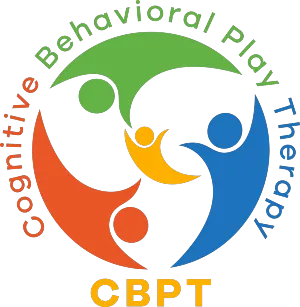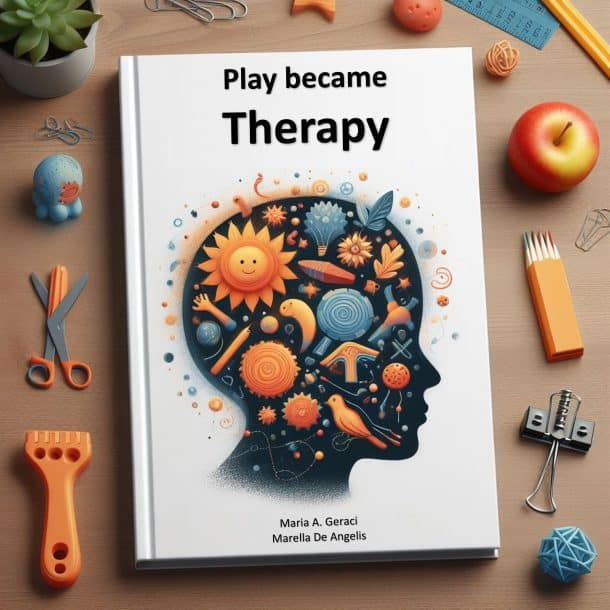MANUALI SULLA CBPT
La Play Therapy Cognitivo-Comportamentale (CBPT-Cognitive Behavioral Play Therapy), nata dalla fusione della Terapia Cognitivo- Comportamentale (CBT-Cognitive Behavioral Therapy) e della Play Therapy (PT), è, innanzitutto, una psicoterapia basata sulla teoria. È rivolta ai bambini di età compresa tra i 3 e gli 8 anni, i quali sono considerati la fascia d’età più adatta alla CBPT, ciò nonostante anche i bambini più grandi possono trarne beneficio. Poiché la CBPT si basa sui principi della terapia cognitivo-comportamentale, ha integrato quest’ultimi in un approccio sensibile allo sviluppo con interventi sia verbali che ludici, proprio perché il gioco è un aspetto fondamentale, soprattutto per i bambini piccoli, le cui capacità linguistiche non sono ancora ben sviluppate. Anche se di solito pensiamo al modo in cui i pensieri irrazionali influenzino i comportamenti e le emozioni, questo aspetto risulta avere più senso per gli adulti che hanno un linguaggio e un raziocinio più sviluppato per riflettere sulle esperienze passate. Per i bambini più piccoli, con un minor numero di esperienze apprese, con un linguaggio meno sviluppato, e, in particolare, con una minore capacità di raziocinare il perché questi pensieri possano essere considerati irrazionali, gli stessi potrebbero essere meglio considerati come disadattivi.
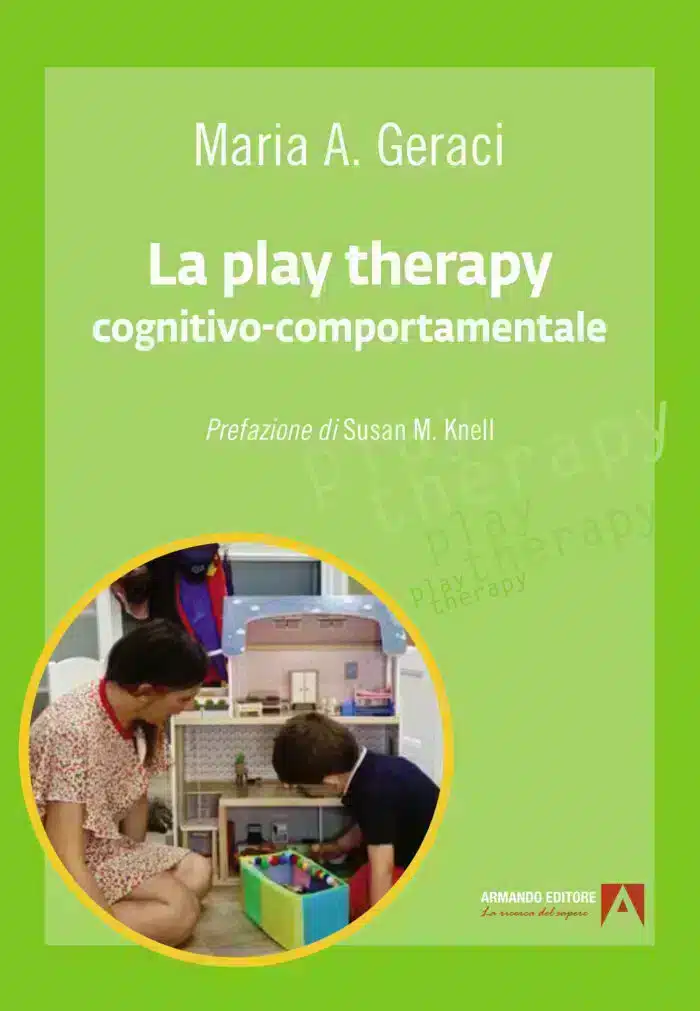

LINGUA ITALIANA
La Play Therapy
Cognitivo-Comportamentale
CONTENUTO
La Play Therapy Cognitivo-Comportamentale è stata sviluppata da Susan M. Knell e, oggi, è un intervento che adatta le tecniche CBT supportate empiricamente in un ambiente di gioco con bambini piccoli. La Play Therapy Cognitivo-Comportamentale sottolinea il coinvolgimento diretto del bambino, con diverse problematiche, nel processo terapeutico. Tutti i lavori di Play Therapy Cognitivo Comportamentale prevedono incontri regolari con i genitori al fine di raccogliere informazioni sui progressi del bambino, di monitorare e intervenire sull’interazione genitore-bambino dando indicazioni fondamentali per il raggiungimento degli obiettivi terapeutici.
AUTORE
MARIA A. GERACI è psicologa dello sviluppo e dell’educazione, psicoterapeuta cognitivo-comportamentale. Autrice di diverse pubblicazioni nazionali e internazionali, attualmente direttrice del Centro Ricerca CBPT di Roma, è docente a contratto in diverse scuole di Specializzazione in Psicoterapia Riconosciute del MIUR e in diversi Master Universitari. Vanta esperienza ventennale di formazione agli insegnanti di scuola di ogni ordine e grado.
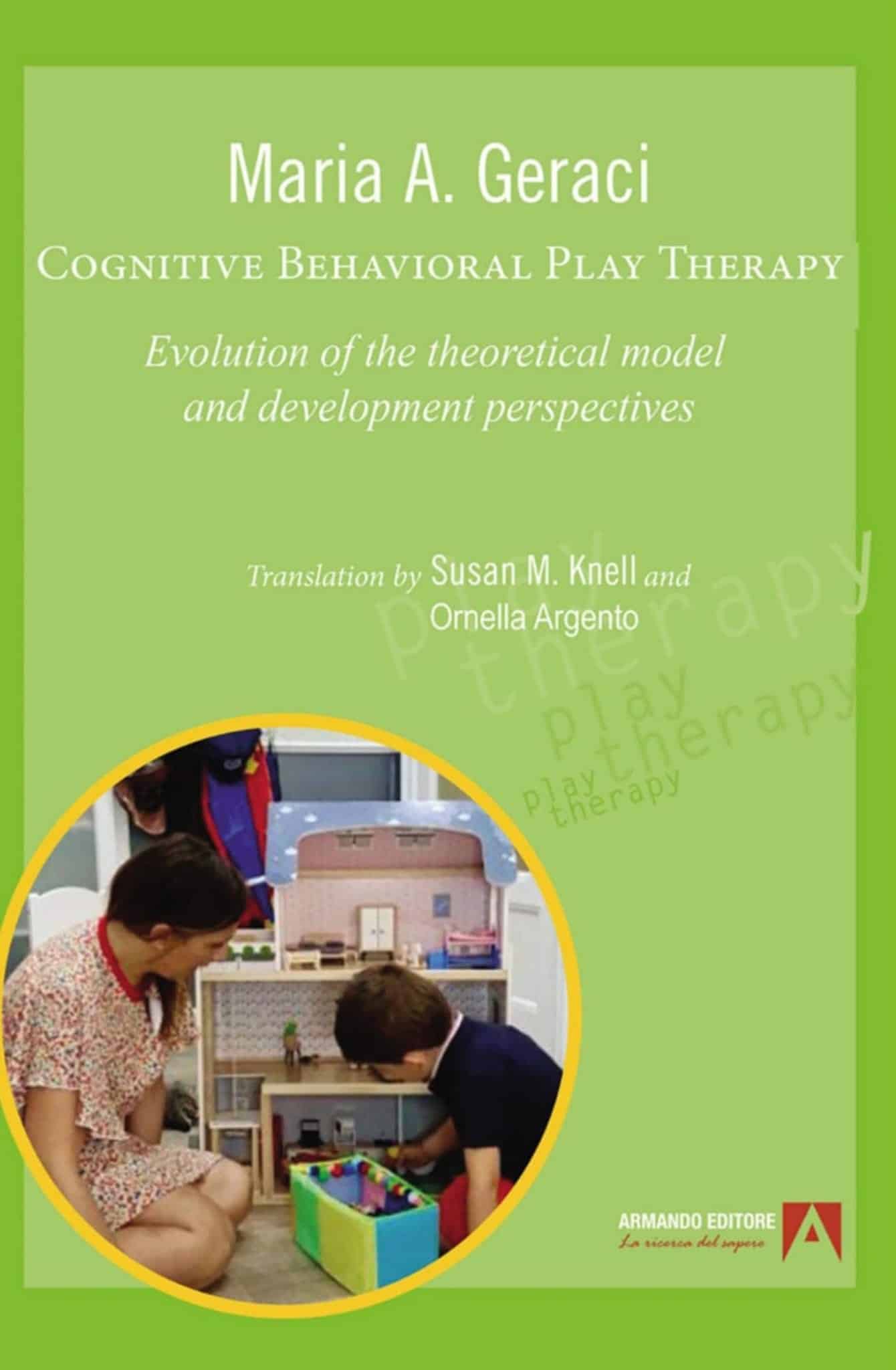

LINGUA INGLESE
COGNITIVE BEHAVIORAL PLAY THERAPY: Evolution of the theoretical model and development perspectives.
CONTENUTO
After 30 years from its first applications, Cognitive Behavioral Play Therapy (CBPT) finds again its central role as the therapy of choice for childhood. It was born as a therapy aimed at children, including pre-school children, capable of integrating evidence-based CBT techniques within the Play Therapy paradigm.
The volume presents the update of the theoretical model of CBPT by Maria Angela Geraci, where, in addition to the integration of all the studies present in the literature, she underlines the decisive role of the case conceptualization in CBPT. Finally, it defines a path for selecting appropriate tools and procedures alongside a design path for future research.
AUTORE
MARIA A. GERACI è psicologa dello sviluppo e dell’educazione, psicoterapeuta cognitivo-comportamentale. Autrice di diverse pubblicazioni nazionali e internazionali, attualmente direttrice del Centro Ricerca CBPT di Roma, è docente a contratto in diverse scuole di Specializzazione in Psicoterapia Riconosciute del MIUR e in diversi Master Universitari. Vanta esperienza ventennale di formazione agli insegnanti di scuola di ogni ordine e grado.
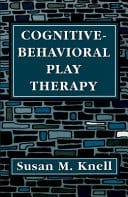

LINGUA INGLESE
COGNITIVE BEHAVIORAL PLAY THERAPY
CONTENT
Cognitive-Behavioral Play Therapy (CBPT) incorporates cognitive and behavioral interventions within a play therapy paradigm. It provides a theoretical framework based on cognitive-behavioral principles and integrates these in a developmentally sensitive way. Thus, play as well as verbal and nonverbal approaches are used in resolving problems. CBPT differs from nondirective play therapy, which avoids any direct discussion of the child’s difficulties. A specific problem-solving approach is utilized, which helps the child develop more adaptive thoughts and behaviors. Cognitive-behavioral therapies are based on the premise that cognitions determine how people feel and act, and that faulty cognitions can contribute to psychological disturbance. Cognitive-behavioral therapies focus on identifying maladaptive thoughts, understanding the assumptions behind the thoughts, and learning to correct or counter the irrational ideas that interfere with healthy functioning. Since their development approximately twenty-five years ago, such therapies have traditionally been used with adults and only more recently with adolescents and children. It has commonly been thought that preschool-age and school-age children are too young to understand or correct distortions in their thinking. However, the recent development of CBPT reveals that cognitive strategies can be used effectively with young children if treatments are adapted in order to be developmentally sensitive and attuned to the child’s needs. For example, while the methods of cognitive therapy can be communicated to adults directly, these may need to be conveyed to children indirectly, through play activities. In particular, puppets and stuffedanimals can be very helpful in modeling the use of cognitive strategies such as countering irrational beliefs and making positive self-statements. CBPT is structured and goal oriented and intervention is directive in nature. It incorporates empirically demonstrated cognitive and behavioral techniques and allows for the empirical examination of treatment outcome. This long-awaited volume will be useful to clinicians of every theoretical persuasion in enabling them to formulate fresh approaches for helping their young patients.
AUTHOR
Susan M. Knell holds a PhD in Clinical Psychology and a MA in Developmental Psychology. She is the author of the book, Cognitive Behavioral Play Therapy (1993) which has been translated into Italian and Turkish. As the first to study and write about the application of Cognitive Behavior Therapy to young children, she integrated Cognitive Behavioral interventions and Play therapy in developmentally sensitive ways. She has written chapters on CBPT in many edited books on Play Therapy. As a clinical Psychologist, she has provided assessment and therapeutic services to children, adolescents, and adults for almost 40 years. In addition to her clinical practice, she supervises graduate students, trains mental health professionals internationally, and has done research and teaching.
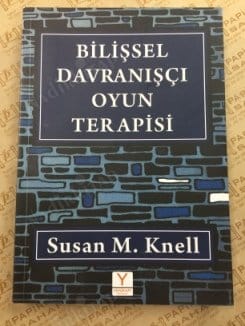
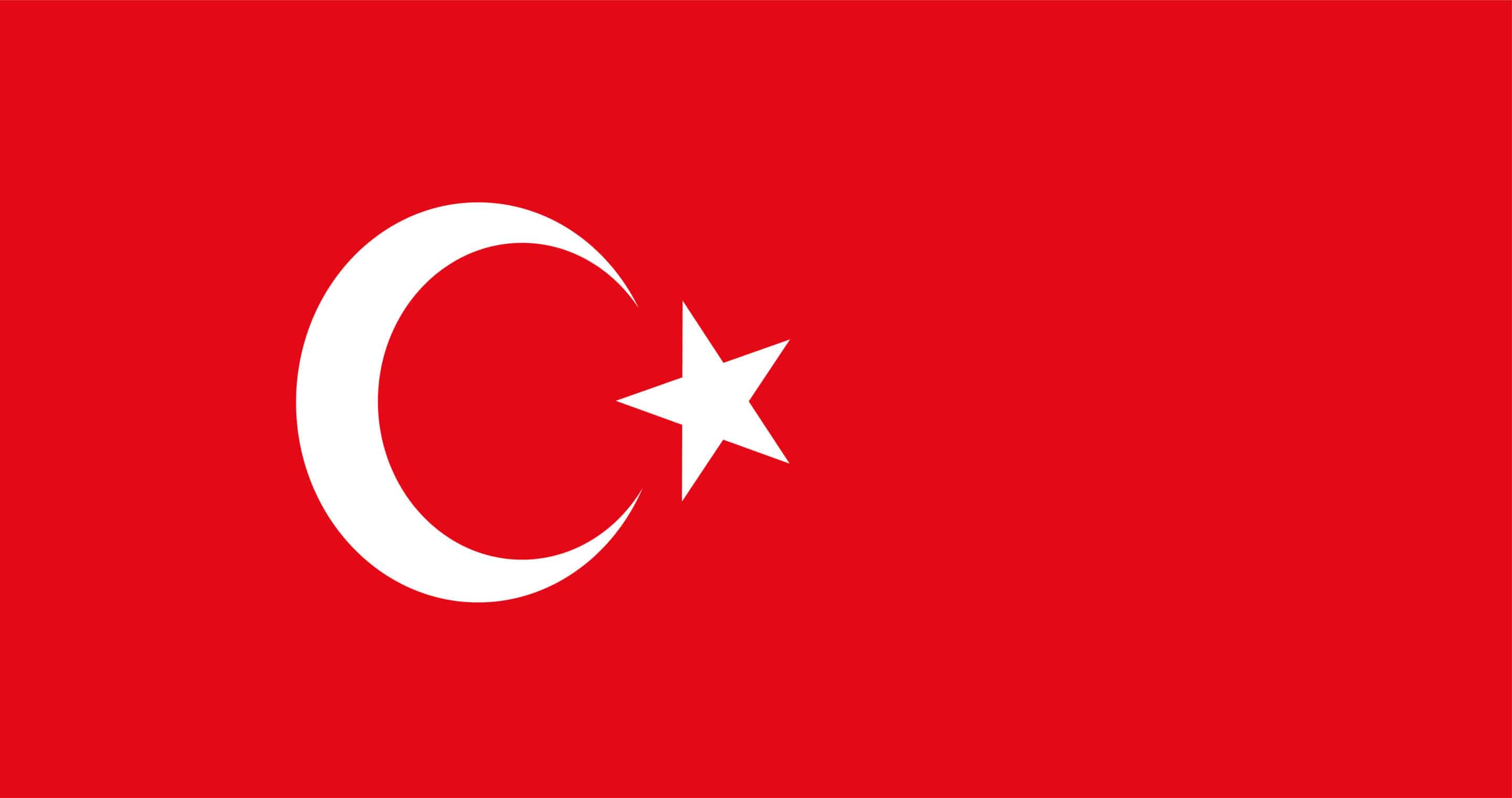
LINGUA TURCA
BİLİŞSEL DAVRANIŞCI OYUN TERAPİSİ
CONTENUTO
BİLİŞSEL DAVRANIŞCI OYUN TERAPİSİ HAKKINDA Bilişsel Davranışçı Oyun Terapisi (BDOT) oyun terapisi paradigması içinde bilişsel ve davranışçı müdahaleleri birleştirmektedir. Bilişsel-davranışçı ilkelere dayanan teorik bir çerçeve sağlamaktadır ve bunları gelişimsel olarak hassas bir yolla bütünleştirmektedir. Böylece, sözlü ve sözlü olmayan yaklaşımların yanında oyun, problemlerin çözümünde kullanılmaktadır. Bilişsel-davranışçı terapiler, bilişlerin insanların nasıl hissettiği ve davrandığını belirlediği ve hatalı bilişlerin psikolojik rahatsızlıklara yol açtığı temel varsayımına dayanmaktadır. Bilişsel-davranışçı terapiler uyumsuz düşünceleri belirlemeye, düşüncelerin arkasındaki çıkarımları anlamaya ve sağlıklı bilişsel işleyişe engel olan mantıksız fikirleri düzeltmeye odaklanmaktadır. Gelişimi yaklaşık yirmi beş yıl öncesine dayanan bu gibi terapiler geleneksel olarak yetişkinlerle kullanılmaktayken; son zamanlarda ergenler ve çocuklarla da kullanılmaya başlanmıştır. Okul öncesi ve okul dönemindeki çocuklarının düşünce sistemlerindeki çarpıtmaları anlamak ve düzeltmek için çok küçük oldukları yaygın olarak kabul görmektedir. Bununla birlikte, BDOT’daki yeni gelişmeler, tedavi gelişimsel olarak duyarlı olursa ve çocukların ihtiyaçlarına uyum sağlanarak düzenlenirse, bilişsel stratejilerin küçük çocuklarla da etkin bir şekilde kullanılabileceğini göstermektedir. Örneğin, bilişsel terapi metotları yetişkinlerle direk konuşulurken, çocuklara dolaylı olarak, oyun faaliyetleri ile iletilmelidir. Özellikle, kuklalar ve oyuncak hayvanlar mantıksız davranışlara karşı gelme ve pozitif öz ifade gibi bilişsel stratejilerin kullanılmasını modellemede çok faydalı olabilmektedir. BDOT, yapılandırılmış ve hedef odaklıdır ve müdahalesi doğası gereği yönlendiricidir. Bilişsel Davranışçı Oyun Terapisi (BDOT), “Yenikapı- Psikoloji ve Terapi Yayınları” tarafından okurlara sunulmuştur.
AUTORE
Susan M. Knell holds a PhD in Clinical Psychology and a MA in Developmental Psychology. She is the author of the book, Cognitive Behavioral Play Therapy (1993) which has been translated into Italian and Turkish. As the first to study and write about the application of Cognitive Behavior Therapy to young children, she integrated Cognitive Behavioral interventions and Play therapy in developmentally sensitive ways. She has written chapters on CBPT in many edited books on Play Therapy. As a clinical Psychologist, she has provided assessment and therapeutic services to children, adolescents, and adults for almost 40 years. In addition to her clinical practice, she supervises graduate students, trains mental health professionals internationally, and has done research and teaching.
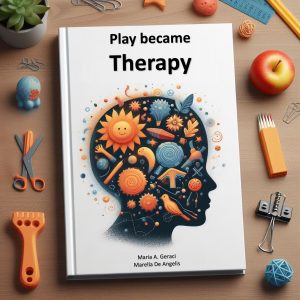
Scarica subito il tuo ebook gratuito. Inserisci un'e-mail valida qui sotto.
DIVENTA UN TERAPEUTA ESPERTO
NELLA PLAY THERAPY COGNITIVO-COMPORTAMENTALE
